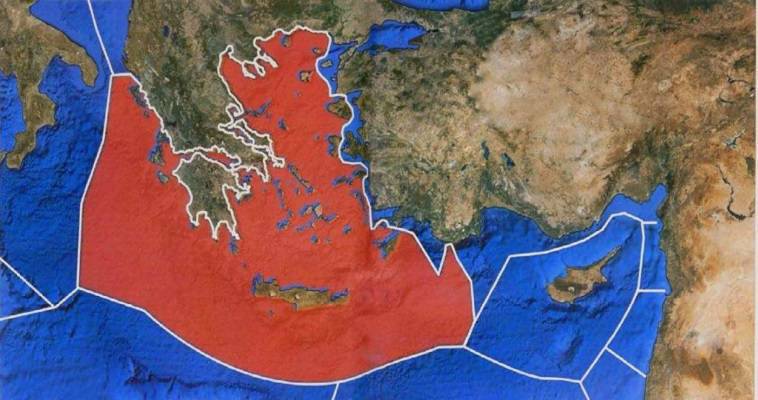Stavros Lygeros: Is Greece confined to the Aegean and is the east Med turning into a “Turkish lake”
11/06/2020
The Greek-Italian agreement on the delimitation of the EEZ, combined with the announcement of Turkish research outside Greek territorial waters, but within the Greek continental shelf in the Kastellorizo-Rhodes-Karpathos-Kassos-Crete arc, underscores the importance of the Mediterranean conflict and therefore the national security of Greece.
This may be in the forefront in recent years, but for decades Greece has been absent from the Eastern Mediterranean. It had trapped itsself strategically and operationally in the Aegean, because there it was then facing Turkish expansionist pressure. Kastellorizo is a small island complex at geographic extremities of Greece, which in Athens was perceived as an “outgrowth” of the Aegean in the Eastern Mediterranean, without attributing to it its critical strategic importance.
After the Turkish invasion of 1974, the doctrine “Cyprus is far away” had prevailed in Athens, behind which was hidden the small-minded Greek view that “Cyprus is a burden for Greece”! Somehow, Greece essentially withdrew from the Eastern Mediterranean, where its presence was rudimentary anyway. This doctrine of evasion has permeated generations of Greek politicians and diplomats, with the result that for decades the one-dimensional conception of national security that diminishes Greek interests exclusively in the Aegean has prevailed.
This strategic reversal suited Ankara. It unfettered it in the Eastern Mediterranean. An attempt to reverse this diffuse perception was made after 1993 by the government of Andreas Papandreou with the doctrine of the Single Defense Area with the aim of defending the unoccupied part of Cyprus. In this context, the supply of the Russian S-300 anti-aircraft system was included. At that time, Greece had begun to establish an aerial and naval presence in the Eastern Mediterranean.
It should be noted that at the same time (1993-96) the Minister of Defense, Gerasimos Arsenis, had made openings to both Israel and Egypt, as part of a pioneering military diplomacy for that time. It was a more geopolitically balanced political continuation of the privileged relations that Andreas Papandreou had attempted to form with Arab countries since the 1970s, based on the doctrine of the three dimensions of Greek foreign policy (European, Balkan and Mediterranean).
Re-entrapment in the Aegean
The times, however, did not favor the deepening of roots and the development of those diplomatic openings, as in the 1990s Israel maintained privileged relations with Kemalist Turkey, while Egypt also maintained a balance, avoiding anything that would bother Ankara. After all, there was not enough time for those auspicious beginnings to pay off.
The succession of Andreas Papandreou by Konstantinos Simitis, in practice, denuded and gradually canceled not only the doctrine of the Single Defense Area, but also the openings fostered by Arsenis. The crisis in Imia at the beginning of 1996, which re-entrapped Greece in the Aegean, also played a decisive role on a political-psychological level. When, in fact, due to the suffocating pressures of the West (and Israel) the S-300s, instead of being installed in Cyprus, were stored in Crete, the Single Defense Area degenerated operationally and remained in force only on paper.
The return began much later, at the initiative of the Israelis, mainly due to the rift in their relations with Erdogan’s Turkey. This is how the triangular cooperation Greece-Cyprus-Israel and Greece-Cyprus-Egypt emerged and finally the trilateral cooperation of Greece-Cyprus-Jordan. All three of these geopolitical triangles, which are gradually gaining strategic scope, have been facilitated by the hostility of the Erdogan regime to Israel and the Sisi regime in Egypt.
They would not have thrived, however, if it had not been for the deepening US-Turkish rift, despite President Trump’s attempt to prevent it from turning into an unbridgeable gap. In fact, in the Eastern Mediterranean, a geostrategic network has been formed and is tending towards consolidation, which excludes and isolates Turkey, although this is not understood for obvious reasons.
What a Turkish admiral said in 2008?
The important thing is that this geostrategic network has the blessings of both Americans and French. Paris is showing a keen interest in the Eastern Mediterranean, in what is basically a return to the area. First, because of energy, through Total, which has acquired mining rights in both the Cypriot EEZ and the Greek continental shelf. Secondly, because of political-military considerations through the agreement with the Republic of Cyprus, but also with Greece for military facilities.
Even belatedly, and perhaps even at the initiative of others, Greece has again seen itself as a key country in the Eastern Mediterranean, which is a significant turning point. Its return to the region comes at a time when the maritime area, in addition to its traditional strategic importance as a central route for international trade, has begun to take on an additional dimension, due to its nuanced indications that it hides large gas fields.
At this point it is useful to mention the statement of the then Turkish General Staff Chief Admiral Metin Atac on October 19, 2008: “I believe that the Eastern Mediterranean will become a hotbed of conflicts and conflicts due to the importance oil will soon acquire there. Due to its oil, it will become a second Arab Gulf. Turkey must be vigilant and react.”
The doctrine of the “Blue Homeland”
Indeed, Turkey has since begun to plan and implement the strategy it later called the “Blue Homeland.” A key component of this strategy, as Davutoglu has put it at an unsuspecting time, is the transformation of Turkey into a major aerial and maritime force, with a dominant presence throughout the Eastern Mediterranean.
As a result of this strategy – part of the broader neo-Ottoman strategy for Turkish hegemony in the post-Ottoman space in Asia, Africa and the Balkans – it is Ankara’s decision to perpetuate and consolidate its aeronautical presence in this maritime area. For a long time we had seen the successive Navtex that bounded sea areas, which usually included both Greek and Cypriot EEZs (based on the principle of the middle line).
This was followed by maps that Turkish Defense Minister Akar had presented to his Libyan interlocutors in order to persuade them to demarcate a continental shelf, even though they do not share sea borders. Several months later we had the signing of the memorandum with the government of Tripoli, which was almost check mate move in the same direction, towards the displacement of Greece from the Eastern Mediterranean.
Captive within a “Turkish lake”
Indeed, the fact that Erdogan did not hesitate to intervene decisively in the Libyan war shows that the “Blue Homeland” is much more than a sum of occasional moves. It is a strategic doctrine/guide that aims to make the heart of the Eastern Mediterranean a “Turkish lake”. And for now, Ankara has every reason to be pleased with things so far.
Due to the Turkish intervention, the mass relocation of Islamist fighters, weapons systems and Turkish officers, the faltering government of Tripoli was not only stabilized, but also went on the offensive , gaining the upper hand in the theater of military operations. In contrast to Greek inaction, but also to the relatively timid attitude of Egypt, France and Italy, Turkey has established itself in Libya.
This can be annoying for all other “players”, but for Greece it is a nightmare. It is not just that Turkey is militarily on Greece’s tail, or that with the memorandum it signed with the Saraj government it underwrote mortgages to get its hands on any energy deposits. It is also that it is essentially trying to turn many Greek islands into geopolitically isolated pockets within a “Turkish lake”, or, to use Ankara’s terminology, to trap them inside the “Blue Homeland”.





